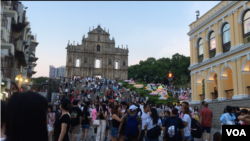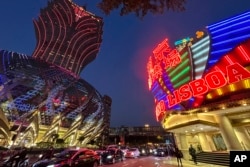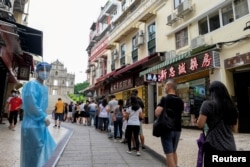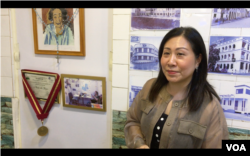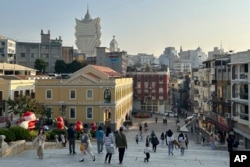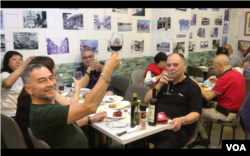Macao is known as “the Las Vegas of Asia,” with its glitzy casinos and huge gaming industry surpassing that of its U.S. counterpart, but the region is also home to a unique ethnic group — the Macanese.
Almost 25 years after the former Portuguese colony returned to Chinese sovereignty in 1999, this community of native-born mixed-race Chinese-Portuguese people, who also have distant lineage from former Portuguese territorial possessions such as Malacca and Ceylon, is now feeling the challenges of maintaining their population, language and culture.
Their number — 13,021 people according to the latest census — as well as reduced use of the Portuguese language, is raising worries among Macanese that Macao may lose what’s unique about its identity — its Portuguese influences. In addition, the government last year confirmed that it has ended preferential treatment for Portuguese nationals wanting to move to the city.
“This means our Portuguese culture will be weak for the next generation,” said Delfim Chacim, retiree from a Macanse family that has lived in Macao for four generations. His granddaughter speaks Portuguese, but he said many Macanese youngsters cannot, even though Portuguese is an official language along with Chinese, because hardly anyone speaks it anymore.
Most people in Macao are ethnic Chinese and speak Cantonese. In recent years, fluency in English has become much higher than Portuguese, according to Macao’s Statistics and Census Service.
As time passes, Chacim and others fear, the only thing left will be colonial-era buildings, such as the landmark Ruins of Saint Paul's, a 17th-century Catholic religious complex.
“All we’ll see will be the architecture built by the Portuguese people, such as the fortress, but they won’t know the real story,” Chacim said. Macao “will be no different from any other province in China” without its characteristic language and culture.
Although the latest census conducted in 2021 showed the number of people who are either full or mixed Portuguese has increased by nearly 5,000 compared to 2011, since 2001, shortly after the handover, the population has remained around 2% of the total.
During the COVID-19 pandemic, Macau’s overall population lost about 10,000 residents, including Portuguese expatriates and migrant workers due to tough quarantine policies and border restrictions. It’s not clear how many of those who left have returned.
Adding to the fears of a declining Macanese and Portuguese culture and population, Macao’s government quietly in recent years and officially last year stopped giving resident ID cards and a path to permanent residency to Portuguese nationals who want to live in the city.
Previously, Portuguese nationals received the cards once they found a job in Macao and could become permanent residents after seven years. Now, they are treated like other foreigners and given only a temporary work permit, unless they have special skills or family already in the city.
“We want our next generation to be proud of what we are. We don’t want them to lose their culture, not knowing what it was like the last 20, 30, 50 years,” said Ivone de Jesus, a fifth generation Macanese who helps run her family’s popular restaurant Cozinha Aida, which serves home-cooked Macanese cuisine passed down through the generations.
De Jesus said her late grandmother, Aida, who carefully saved the recipes before she passed away, was one of only 50 people who could speak the creole dialect called Patua in Macao. The dialect is derived from Portuguese mixed with Malay and Sinhalese, and later became strongly influenced by Cantonese, but it is almost extinct.
De Jesus and others said the government has given support to maintaining Portuguese and Macanese cultures, including helping restaurants like her family’s preserve their cuisines. The government also encourages people to learn the language by providing funding to schools to teach Portuguese.
But many Macanese and Portuguese disagree with ending preferential treatment for Portuguese nationals, pointing out that unless the population of Portuguese speakers grows, it will be hard to preserve Macao’s Portuguese identity and language.
“First of all the Portuguese people are what’s giving Macao its culture here. … Let’s not talk about how good or bad the place was run. It is a very subjective matter, but Macao is Macao because they were here. It was ruled by them. It brings the flavor, the culture, the color, everything, even the food, the bloodline … so it would be really important that Portuguese people come back here,” de Jesus said.
Miguel Senna Fernandes, president of the Macanese Association, said the government’s decision contradicts its policy of promoting Portuguese language fluency so that Macao can be a platform to promote relations between China and Portuguese-speaking countries.
“Macao’s government should attract Portuguese to come and settle down in Macao, but they’re not doing this. They’re doing the opposite,” Fenandes said. “They’re giving this kind of image that they’re not welcoming them. … What’s the use of promoting Portuguese in the territory when you don’t want the people who speak it; it’s like wanting to promote Chinese but you don’t want Chinese people.”
Jorge Menezes, a Portuguese lawyer in Macao, sees the cancellation of preferential treatment for Portuguese people as part of a trend.
“The Portuguese are no longer special. … That’s of course a betrayal of the whole idea of the relationship between Portugal and Macao after the handover,” Menezes said. “The language is vanishing in official functions. … It’s part of a trend of Macao being less autonomous towards China than it was meant to be under the bilateral treaty with Portugal and Macao’s Constitution.”
VOA reached out to Macao authorities for comment about the concerns and why it decided to cancel preferential treatment for Portuguese people but has yet to receive a response.
Over the years, the government has tried to protect architectural heritage and required casino operators’ winning concessions to invest in revitalizing old districts. The Macao Government Tourism Office, or MGTO, told VOA that it and other government agencies have been promoting the unique culture of Macanese cuisine.
"Macao’s designation as a UNESCO Creative City of Gastronomy in 2017 is highly relevant to help preserve Macao’s unique gastronomic cultural heritage. Immediately after the designation, MGTO together with other entities unfolded an array of initiatives, with the preservation of Macanese food as part of the city’s heritage as one of the main tasks," it said in a written reply.
De Jesus said she doesn’t think the government is trying to reduce the Portuguese population, which was always small, even before the handover.
“There’s a saying that China, this place, doesn’t want foreigners here. Actually, I see it differently. For the last 10, 20, 30 years, we’ve always had different foreigners from different countries here. They were workers, experts, professionals, business owners. I’m not sure, but my personal opinion is that what China wants to do is … they want job opportunities-wise to go back to local people,” de Jesus said.
But De Jesus and other Macao residents agree it is the combination of the two cultures that makes Macao special.
“I’m talking about Portuguese, Portuguese, Portuguese, but before the Portuguese were here, we were also Chinese, so the Chinese were part of the Portuguese culture and the Portuguese were part of the Chinese culture, so I think it’s important that we always maintain an identity of having both,” said de Jesus.




